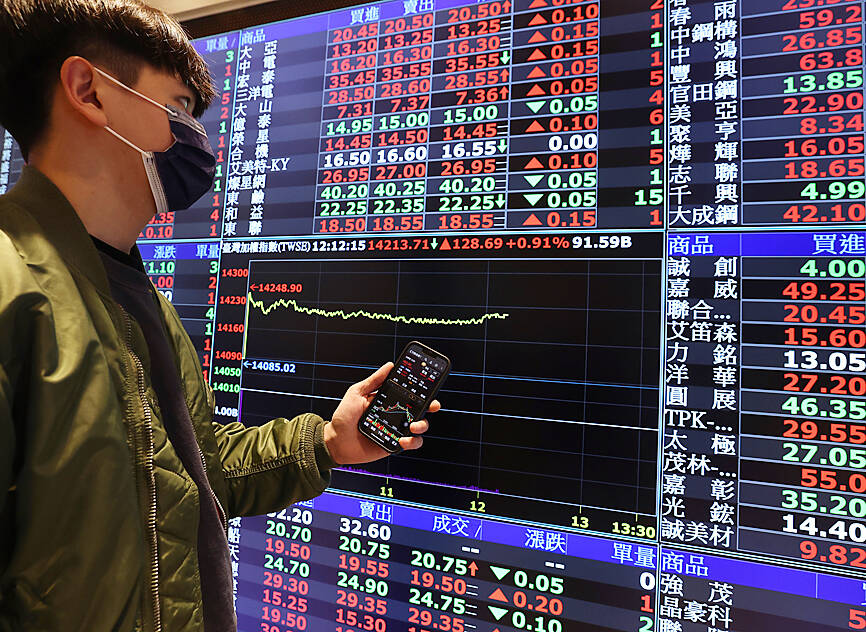Investors might take heart from the latest twist in the presidential race, as a tie-up of opposition candidates raises the odds of a more China-friendly government taking post next year.
The benchmark TAIEX rose on Wednesday and the New Taiwan dollar advanced, as traders digested the announcement that the Chinese Nationalist Party (KMT) and the Taiwan People’s Party (TPP) would put forward a united candidate. That came as a relief for some who have been worried about a potential deterioration in cross-strait relations should Vice President William Lai (賴清德), the Democratic Progressive Party’s (DPP) presidential candidate, who has consistently led opinion polls, win.
Geopolitical risks have been an overhang over Taiwanese equities for years, with investors fretting over the possibility of a military conflict between Taipei and Beijing. While the TAIEX has rallied more than 20 percent this year as an artificial intelligence (AI) boom buoyed chip giants, foreigners are on track for a fourth straight year of outflows.

Photo: CNA
“It gives us a sense of temporary relief on the election uncertainty,” said Xiadong Bao, a fund manager at Edmond de Rothschild Asset Management in Paris. “The alliance raises the potential for further dialogues to improve cross-strait relations.”
Voters going to the polls on Jan. 13 are to choose between a ruling party determined to maintain Taiwan’s sovereignty, and an opposition that sees closer ties with China as the only viable path. The outcome would define Taipei’s relations with Beijing in the years to come, while also setting the tone for US-China tensions.
Then-US House of Representatives speaker Nancy Pelosi’s visit to Taipei in August last year raised angst in financial markets, as Beijing ratcheted up military drills around Taiwan in a show of warning. The TAIEX fell 1.6 percent in the session before Pelosi met President Tsai Ing-wen (蔡英文), but posted small gains on the day.
“Taiwan market volatility tended to rise in the six months leading up to the presidential elections,” Goldman Sachs Group Inc strategists including Alvin So (蘇瑋忠) wrote in a note. “Taiwan equities have shown greater performance in the three months following a KMT victory, while underperforming significantly after a DPP victory.”
While the election remains a key focus, the Taiwanese market is also affected by an array of factors, including the US monetary policy, as well as semiconductor and AI cycles.
A potential dovish pivot by the US Federal Reserve might drive more inflows into emerging markets, with such expectation on full display on Wednesday following a softer-than-expected US inflation report.
The local currency on Wednesday rose the most since July after sliding more than 4 percent this year, hammered by a large rate differential with the US and equity outflows. The TAIEX closed up 1.3 percent.
Wednesday’s announcement by the opposition “should be broadly positive for Taiwanese and Chinese assets, especially when considered in conjunction with improving US-China relations,” said Rory Green, China economist at TS Lombard.
Sectors most exposed to cross-strait trade, including semiconductor companies, agriculture producers and tourism-related firms stand to benefit, he added.

KEEPING UP: The acquisition of a cleanroom in Taiwan would enable Micron to increase production in a market where demand continues to outpace supply, a Micron official said Micron Technology Inc has signed a letter of intent to buy a fabrication site in Taiwan from Powerchip Semiconductor Manufacturing Corp (力積電) for US$1.8 billion to expand its production of memory chips. Micron would take control of the P5 site in Miaoli County’s Tongluo Township (銅鑼) and plans to ramp up DRAM production in phases after the transaction closes in the second quarter, the company said in a statement on Saturday. The acquisition includes an existing 12 inch fab cleanroom of 27,871m2 and would further position Micron to address growing global demand for memory solutions, the company said. Micron expects the transaction to

Nvidia Corp’s GB300 platform is expected to account for 70 to 80 percent of global artificial intelligence (AI) server rack shipments this year, while adoption of its next-generation Vera Rubin 200 platform is to gradually gain momentum after the third quarter of the year, TrendForce Corp (集邦科技) said. Servers based on Nvidia’s GB300 chips entered mass production last quarter and they are expected to become the mainstay models for Taiwanese server manufacturers this year, Trendforce analyst Frank Kung (龔明德) said in an interview. This year is expected to be a breakout year for AI servers based on a variety of chips, as

Global semiconductor stocks advanced yesterday, as comments by Nvidia Corp chief executive officer Jensen Huang (黃仁勳) at Davos, Switzerland, helped reinforce investor enthusiasm for artificial intelligence (AI). Samsung Electronics Co gained as much as 5 percent to an all-time high, helping drive South Korea’s benchmark KOSPI above 5,000 for the first time. That came after the Philadelphia Semiconductor Index rose more than 3 percent to a fresh record on Wednesday, with a boost from Nvidia. The gains came amid broad risk-on trade after US President Donald Trump withdrew his threat of tariffs on some European nations over backing for Greenland. Huang further

HSBC Bank Taiwan Ltd (匯豐台灣商銀) and the Taiwan High Prosecutors Office recently signed a memorandum of understanding (MOU) to enhance cooperation on the suspicious transaction analysis mechanism. This landmark agreement makes HSBC the first foreign bank in Taiwan to establish such a partnership with the High Prosecutors Office, underscoring its commitment to active anti-fraud initiatives, financial inclusion, and the “Treating Customers Fairly” principle. Through this deep public-private collaboration, both parties aim to co-create a secure financial ecosystem via early warning detection and precise fraud prevention technologies. At the signing ceremony, HSBC Taiwan CEO and head of banking Adam Chen (陳志堅)